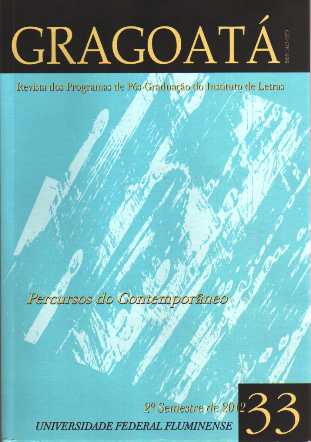Elizabeth Bishop’s Queer ecocriticism in "Bras/zil"
DOI:
https://doi.org/10.22409/gragoata.v17i33.33020Keywords:
queer, ecocriticism, epistemic vulnerability, Elizabeth BishopAbstract
This article demonstrates that, while Elizabeth Bishp voiced her reservations against the essentialist logic of gender, she built an anti-essentialist poetics of gender to engage the vulnerability of her position as a poet of the Anglo-American literary establishment who, historically and thus unavoidably, represented the sovereign subject’s voice and gaze over Brazil. I argue for an ecocritial reading of the conflict between the poet’s stated refusal of a gendered authorial identity for herself and, by contrast, her construction of a gendered geopolitical identity for the other. My aim is twofold: to consider what happens when the normative genders of geopolitics are unsettled; and, finally, to feed the debate, proposed by Silviano Santiago, as to the ethical value of Bishop’s representations of Brazil.
Downloads
Downloads
Published
How to Cite
Issue
Section
License
Authors who publish in Gragoatá agree to the following terms:
The authors retain the rights and give the journal the right to the first publication, simultaneously subject to a Creative Commons license CC-BY-NC 4.0, which allows sharing by third parties with due mention to the author and the first publication by Gragoatá.
Authors may enter into additional and separate contractual arrangements for the non-exclusive distribution of the published version of the work (for example, posting it in an institutional repository or publishing it in a book), with recognition of its initial publication in Gragoatá.

Gragoatá is licensed under a Creative Commons - Attribution-NonCommercial 4.0 International.














